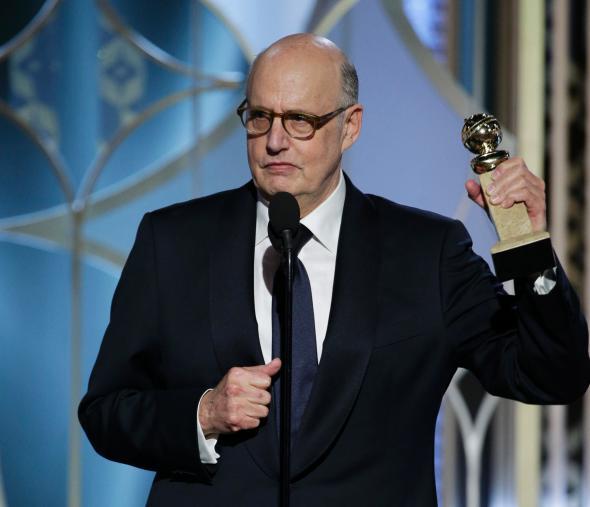One of the most impressive aspects of Transparent—the critically acclaimed, Amazon-produced show that took home Golden Globes on Sunday night for both best TV series, comedy or musical, and best actor in a TV Series, comedy or musical, for Jeffrey Tambor—is that while the series revolves around a transgender character (Tambor’s Maura) and themes of sexual and gender inclusiveness, it manages to be much more than a simplistic PSA for the LGBTQ movement. To the contrary, the show, cultural politics aside, is commendable in purely artistic terms: The writing is elegant and funny, the characterization subtle and compassionate, and the narrative world well-observed and artfully rendered. I may be biased, but I cannot think of another comedy from 2014 that was as well-conceived and executed as Jill Soloway’s beautiful little series.
Appropriately, most critics have responded to Transparent’s Globe wins with congratulations and approval—but not all. In the midst of her recap of the night, the tone of which she described as “uncharacteristically serious,” New York Times TV critic Alessandra Stanley suddenly paused to suggest that the show won due to political correctness. Here is the very strange paragraph in question, which came after comments on Hollywood’s rather awkward response to the recent Sony hacking scandal and the many references to the Charlie Hebdo attacks coming from the stage:
The Sony cyberattack revealed that Hollywood isn’t exactly a profile in courage, but it is an industry that rewards politically correct free speech. “Transparent,” the Amazon.com series about a transgender man who comes out to his family as a woman, won best comedy and the best actor award for its star, Jeffrey Tambor. He dedicated his performance to transgender people.
What are we to make of that opening sentence? Being generous, we might interpret it to mean that Transparent’s content represents a triumph of free speech against, I guess, religious fundamentalism. But then why the snide-seeming “politically correct,” and why the implication that queer free speech is not as courageous as other sorts? I well understand that these kinds of awards show recaps are often written late at night under hurried conditions, but this phrasing has the effect of suggesting that Stanley sees Transparent’s well-deserved win as perfunctory at best and politically—rather than artistically—motivated at worst.
Even if we forgive this weirdly hostile presentation, it’s difficult to be as accommodating with the next line, which blatantly misgenders Maura, a character who is, in point of fact, a transgender woman.* As regular Outward readers will know, we are rarely interested in the kinds of hypersensitive language policing that can come from certain corners of the LGBTQ community—but this gaffe is ridiculous. Anyone who has seen even an episode of Transparent (and Stanley definitely has), or who knows the first thing about trans identity, will understand that one of the central motivations for coming out as trans (and perhaps physically transitioning, as Maura does over the course of the series) is the hope that one will then be referred to as the correct gender. Maura is a woman—indeed, as she so eloquently explains in one episode, she has always been a woman, albeit hidden in a sort of societally imposed male drag—and referring to her as a “transgender man” is both ignorant and disrespectful.
Now, it is entirely possible that this misgendering was an honest mistake made in haste. But given Stanley’s history with sensitive subjects—remember the “angry black woman” fiasco from last fall?—one can’t help but wonder if the TV critic for the most important American newspaper shouldn’t be as prone to error in these areas. After all, we’re not talking about a wrong date or misspelled name, but, rather, the kind of slipups that can come as much from ideological blindness as innocent human error. Back when Stanley was criticized for comparing Shonda Rhimes to the “angry” racial stereotype, many bloggers recalled that the Times’ public editor had, in 2009, announced that she would receive special editing attention to protect her from future mistakes. It is a shame that person apparently had Sunday night off.
Update, Jan. 12, 2015, 4:45 p.m.: Since the publication of this post, the New York Times has issued a correction for the misgendering of Jeffrey Tambor’s Transparent character, Maura. It reads:
An earlier version of this column referred incorrectly to Jeffrey Tambor’s character in “Transparent.” The character is a transgender woman, not a transgender man.
